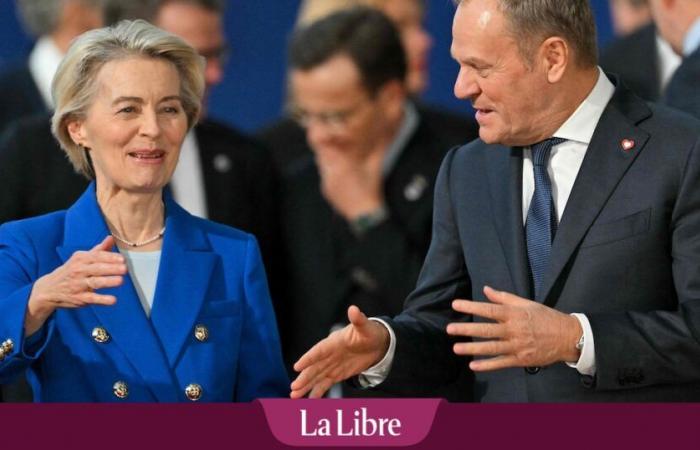
A rediscovered influence
The fact “for being right about Russia” is no stranger to this, underlines a European diplomat. Long before the large-scale invasion of Ukraine, Poland constantly warned its European partners about the warlike intentions of Russian President Vladimir Putin. Warsaw is today one of the strongest supporters of Ukraine and a European defense leader, to which it will devote 4% of its gross domestic product. Poland is now “a significant saving”also recalls the same European source. If we look at the political situation in Germany and France, we still see that Poland is, currently, the strongest side of the “Weimar Triangle”, named after the informal group it forms with the two large states. members of the Union. The strengthening of its European position offers it the opportunity to place its people well in the institutions: Donald Tusk’s former chief of staff, Piotr Serafin, obtained the strategic portfolio of European Budget Commissioner. Poland is, finally, a European country which maintains a strong relationship with the United States, although it remains to be seen how the relationship between the two Donalds, Tusk and Trump will develop. She takes over the presidency of the Council at a time when she carries political weight in Europe that should always have been hers.
Due to the geopolitical context, Poland has decided to put the theme of security at the top of the priorities of the Polish presidency. It will be available in seven areas: external and internal security, information security, economic, energy, food and health security. “Our priorities are not routine”explained Prime Minister Tusk in early December. “We must tell Europe loud and clear that the time to wake up has come.”added the former President of the European Council. “We will be very determined to get Europe to think in Polish in many areas.”insisted Mr. Tusk.
Commission no longer sees serious risk for the rule of law in Poland
Even before the start of its presidency, Poland has already managed to win over the European Commission to its point of view, by obtaining a temporary suspension of its obligations in terms of respecting the right to asylum. Warsaw argued that it was the target of a “instrumentalization” of migration by Belarus and Russia who send thousands of asylum seekers to the Member States on the eastern flank of the Union with the aim of destabilizing them.
Migration in the broad sense will be high on the list of key issues that the Polish presidency will have to deal with. It will be up to him to lead the first discussions in the Council on the revision of the returns directive and on the definition of safe third countries. In another of his favorite areas, Poland “will try to move forward very quickly on the subject of enlargement of the Union to Ukraine”predicts a European source. It should also fuel the debate on the “competitiveness compass” in the various Council formations, as well as that on the greening of European industry. On the legislative level, the Polish presidency will seek, among other things, to land the draft directive on soil monitoring and elements of the “pharma package”. “They are hypermotivated and they will have the advantage that Parliament will want to work with them, which was not really the case with the Hungarian presidency.”slips another European source.
Poland strengthens its leadership role on the European scene
Domestic political issues
Much of the work of a rotating presidency is to advance the legislative agenda, finding compromises between member states in the Council and negotiating with the European Parliament. Unlike presidencies controlled from the capital, Poland has opted for a formula recently applied by Sweden, Spain and Belgium. Namely, it is the country’s Permanent Representation to the EU which manages operations, with the political support of the government. This is evidenced by Warsaw’s choice to place Agnieszka Bartol, a long-term polyglot former European official, at the head of the Polish PR, who knows the mechanics of the Council like the back of her hand. She enjoys the full confidence of Donald Tusk, of whom she was Secretary of State from February to October last, before returning to Brussels.
The presidential election promises to be polarized in Poland: a progressive facing a nationalist
This is because for the Prime Minister and his government, the European presidency also involves domestic political issues, just a stone’s throw from the presidential election. Rafal Traszlowksi, candidate for the Civic Platform, Donald Tusk’s party, will try to take back the supreme office from the hands of PiS, which has held it for a decade. The current president Duda, whose power is more than honorary, is an opponent of the government who plays obstruction, as the PiS candidate, Karol Nawrocki would undoubtedly do if he were elected. “Donald Tusk still needs to consolidate his position in Poland. He will try to use the Polish presidency to show that he plays a key role at European level, in order to strengthen himself on the domestic political scene.says political scientist Janis Emmanouilidis, director of studies at the European policy center.





